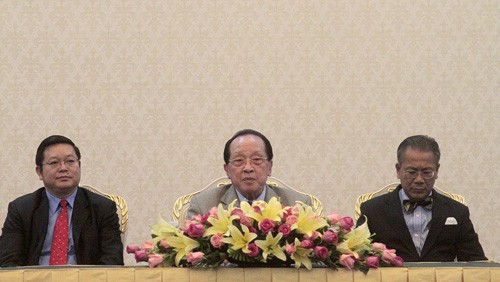(VOVworld) - Despite numerous difficulties this year, enhanced cooperation has helped ASEAN gain a lot of achievements and confirmed that consensus is the key to growth, prosperity, peace, and stability. On top of determination and giving priority to community development programs, the bloc has resiliently resolved internal conflicts and overcomed outside challenges. Finding a common voice can break through any barriers and lead to a more united ASEAN in the future. VOV’s Ánh Huyền comments…….
 |
| Cambodian Foreign Minister Hor Namhong announced ASEAN’s 6-point principle on East Sea issues in July 20th. (Photo: Nguyen Hiep) |
2012 was a challenging year for solidarity among ASEAN members. For the first time in its 45 years, at its Foreign Ministers’ Meeting in July, ASEAN couldn’t agree on a joint statement due to differences over the East Sea. But a week later, member nations reached a consensus on six principles concerning the East Sea, thanks to a tradition of solidarity and cooperation. It’s easy to understand why, at a given moment, the 10 ASEAN member countries with their different histories, cultures, development levels, political and social regimes, and national interests, couldn’t achieve unanimity. Nguyễn Tiến Minh heads the ASEAN Department of the Vietnamese Foreign Ministry ‘This is the biggest challenge for ASEAN, but it has jointly looked for measures to consolidate and maintain the solidarity so that these contradictions can’t drive a wedge. Following the failure at the AMM 45 to ratify a joint communiqué, member nations understood that they might be heading toward a crisis. So as soon as Indonesia proposed six common principles, ASEAN countries agreed with little hesitation and took concrete actions to secure unity’.
ASEAN members have agreed that maintaining peace, stability, and security in the East Sea is of significance for all countries in the region. Every member has agreed to a full implementation of the Declaration on the Conduct of Parties in the East Sea toward signing a Code of Conduct of Parties in the East Sea and to support the settlement of disputes according to international laws.
In line with the theme “ASEAN: a community, a fate”, ASEAN has held fast to its priorities. As part of its approach to setting up a community by 2015, ASEAN adopted a Declaration on Human Rights in addition to establishing an ASEAN Institute for Peace and Reconciliation. Nguyễn Tiến Minh says ‘This is an important step by the bloc in the process of building a political security community under the guideline “unity in diversification”. Each country in the bloc has its own political regime and mechanism influencing its approaches to, for example, resolving human rights issues. But after a year of discussions, ASEAN members have reached a consensus to pay special attention to the region’s diversification and each country’s regulations in addition to abiding by standards on human rights set by Western countries. This has been clarified in the ASEAN Declaration on Human Rights and during discussions’.
During the year, ASEAN has expanded cooperation with non-regional partners. It has raised its relations with the US and India to a strategic partnership. These partners have proposed specific cooperative initiatives with ASEAN, while Japan has pledged to provide ODA worth 500 billion Yen for Mekong region countries to develop infrastructure over the next three years. China has recommended the establishment of an ASEAN-China Committee on Connectivity Cooperation, financed projects with ASEAN via a credit of 10 billion USD, and contributed an additional 5 million USD to the ASEAN – China Cooperative Fund. The Republic of Korea has agreed to help ASEAN with 10 million USD for integration and the EU will put up 15 million Euros until 2016. These achievements are obvious evidence of consensus, unity in diversification, and openness to all countries around the world. ASEAN still has goals to be fulfilled in the future but if it can abide by these basic principles, it will be successful.
Anh Huyen